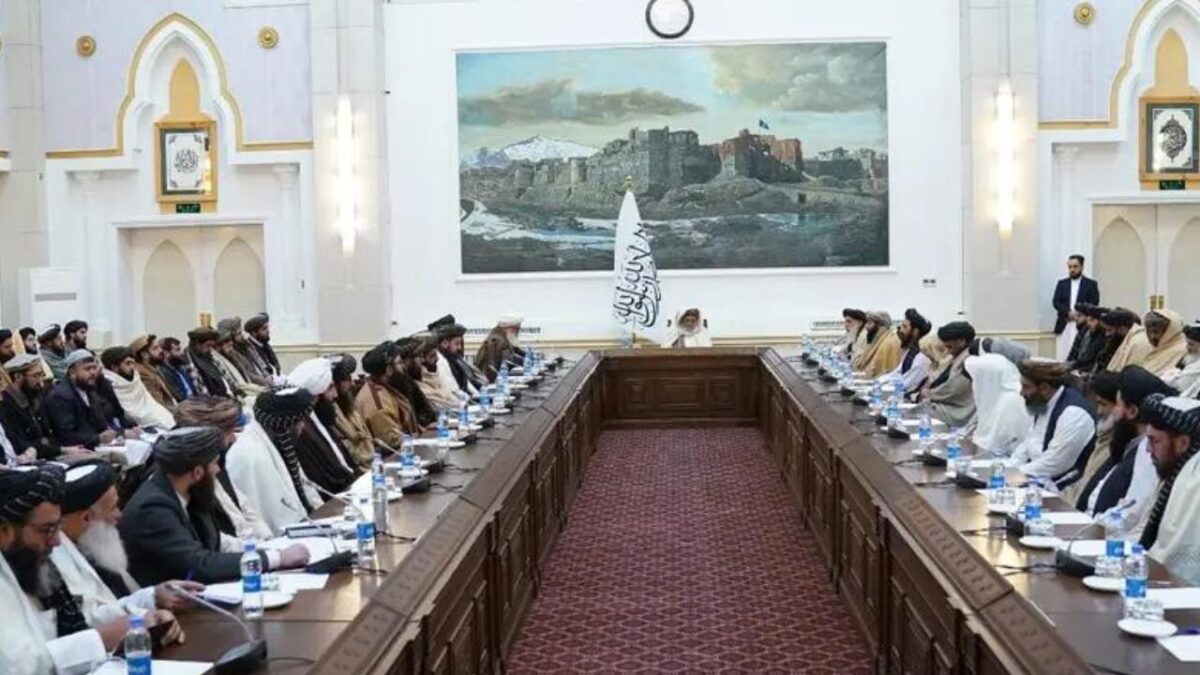Review of Afghanistan developments
As the Taliban enters its fifth year of governance in Afghanistan, the leader of the Taliban has declared the abolition of the caretaker designation for the cabinet and its ministers. In a statement issued on the anniversary of Kabul’s capture by Taliban forces on August 15, Mullah Hibatullah Akhundzada urged ministers and the government cabinet to refrain from using the term “caretaker.” Consequently, with the elimination of the caretaker title, the interim cabinet has been succeeded by a permanent framework.
The decision by the Taliban leader to eliminate the title of caretaker from the cabinet has provoked significant responses from those opposing the Taliban administration. Does the conclusion of the caretaker phase signify a transformation in the character and operation of the Taliban regime, or is it merely the abolition of a designation? To address this inquiry, three primary aspects must be analyzed. First, the circumstances of the adversaries of the Taliban government; second, the stance of the international community; and third, the definition of ‘caretaker government.’
The effect of the opposition’s performance on the revocation of the caretaker title
During this time, the Taliban successfully maintained their governance with minimal serious internal challenges. Political adversaries located outside of Afghanistan were largely consumed by internal conflicts, mutual suspicion, and a lack of cohesive plans and strategies. Also contrary to initial predictions, a formidable and unified military coalition did not emerge within Afghanistan. Organizations such as the ‘National Resistance Front’ and several smaller factions managed to operate in certain mountainous regions; however, these activities never evolved into a nationwide and organized movement. Furthermore, the Taliban government was able to enhance its security apparatus across the nation by leveraging past experiences and effectively thwarting any significant uprisings.
The previous four years have posed a significant challenge for the opposition, revealing that without cohesive leadership, reliable financial backing, and broad social endorsement, no faction can effectively challenge the Taliban government. Consequently, the Taliban have managed to strengthen their hold without the concern of an imminent downfall.
International community stance: navigating between verbal dissent and practical involvement
The second element in abolishing the caretaker title and converting the caretaker cabinet into a permanent cabinet is the stance of the international community. Initially, at the onset of Kabul’s fall, many believed that the Taliban would encounter significant international isolation and harsh sanctions; however, the truth was that nations, particularly those neighboring Afghanistan, prioritized accommodation and engagement over confrontation.
Regional powers including China, Russia, and Iran, owing to their geographical closeness to Afghanistan and their attempts to address the humanitarian crisis there, have opted to engage with the Taliban government. Western nations, despite their criticisms regarding human rights, have effectively maintained open lines of communication and negotiation. International organizations, particularly those focused on humanitarian assistance, have inadvertently bolstered the practical legitimacy of the Taliban, as they have had to interact with this group to provide aid.
Consequently, a significant and cohesive opposition from the international community against the Taliban government did not materialize. When criticism was directed at the Taliban government, it was primarily articulated in diplomatic terms, focusing largely on the handling of the humanitarian crisis and the preservation of security stability, with only a minor portion addressing the government’s structural issues. This context provided the Taliban government with a sense of security, indicating that there was no imminent threat to its existence from the international community.
Caretaker government: an emblem of lack of destiny
The third point pertains to the concept of the “caretaker government.” Following their rise to power in 2021, the Taliban opted not to establish a formal government complete with a constitution and defined structure, but rather referred to themselves as the “Islamic Emirate within the framework of the caretaker government.” This designation, on one hand, provided the Taliban with essential flexibility for future decision-making, while on the other hand, it instilled a sense of uncertainty and lack of permanence.
The general populace, along with a lot of Taliban supporters, were uncertain about the duration of this situation and when it might evolve into a stable and legitimate framework. With the conclusion of the caretaker government, it appears that the Taliban are eager to demonstrate that they have achieved a level of stabilization, rendering the term “caretaker” unnecessary.

The connection between altering one’s name and changing one’s nature
The inquiry pertains to whether the alteration of the name will also result in a modification of the nature and operations of the Taliban government. The fact remains that by eliminating the designation of caretaker and establishing the cabinet as permanent, it is improbable that the Taliban government will alter its governance style. The “Islamic Emirate” is founded on several key principles, the most significant of which are the enforcement of Sharia and leadership. Thus, the removal of the caretaker title and the establishment of a permanent cabinet will not affect any change in these foundational principles, and as a result, the government’s policies will remain unaffected by these pillars and There will be no change. Consequently, the conclusion of the caretaker cabinet represents more of a shift in form and appearance rather than an indication of a genuine transformation.
The Taliban administration has demonstrated throughout the last four years that it possesses restricted adaptability when confronted with both internal and external pressures, making strategic modifications solely when the government’s survival and stability are threatened. Consequently, the conclusion of the caretaker cabinet will not result in a significant transformation for the Afghan populace in crucial aspects.
Related Articles
Taliban Government Four Years After Coming to Power
The Economy of Afghanistan under Taliban governance
Conclusion
In summary, the conclusion of the caretaker cabinet and its evolution into a permanent cabinet ought to be regarded as a “crucial milestone” for the Taliban government in its efforts to solidify authority. The Taliban’s four years of perseverance have yielded results: the fragmentation of the opposition, the absence of a threat to the government’s stability from the international community, and the involvement of regional nations have prompted the Taliban government to dissolve the caretaker cabinet, which had represented political instability. With this decision, at least for the time being, there will be no opportunity to alter the cabinet’s composition by incorporating opposition members.
In summary, for the citizens of Afghanistan, genuine change will only hold significance when there is a profound transformation in governance, political engagement, social equity, and economic prosperity. Merely altering the name or concluding the term of office will not enhance the livelihoods of the people nor create a more promising future.
Follow us on social media

















